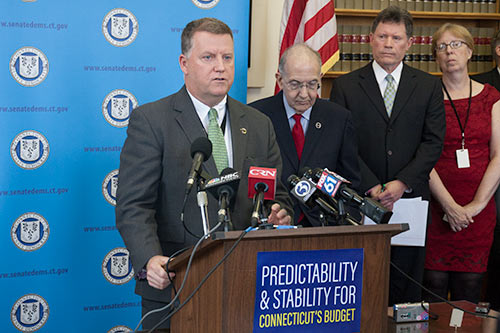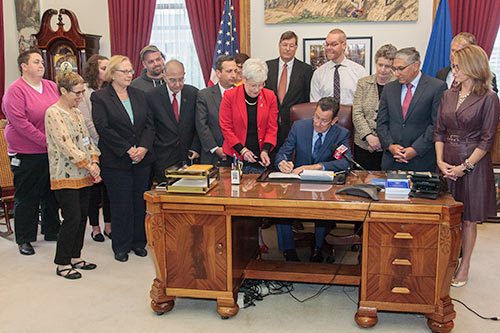Sen. Osten Supports Democrats’ Budget Predictability Plan
State Senator Cathy Osten (D-Sprague) today joined Senate Democratic leaders at the State Capitol to unveil a ‘budget predictability plan’ that would help Connecticut avoid future revenue volatility while simultaneously reducing the chance of unpredictable budget deficits and paying down some underfunded liabilities.
The Senate Democrats’ plan permanently caps the amount of revenue that the state can expect to collect every year from its highly volatile estimates & finals (mostly capital gains) portion of the state income tax; the plan caps those estimates at $3.1 billion per year, the current year’s collection rate, and does not assume any more revenue will be collected from Connecticut’s wealthiest residents.
Any revenues that might be collected above that $3.1 billion in future years would be dedicated to increasing the state’s budget reserve (known as the ‘Rainy Day Fund’) or making payments on unfunded liabilities, such as employee retirement pensions. Contributions could also be dedicated to certain one-time capital projects, paying in cash, rather than borrowing money.
The Senate Democrats’ plan builds on recent Democratic efforts to lay out a sustainable path for responsible allocation of future-year budget surpluses, which also target budget reserve savings and accelerated debt repayment. Today’s proposal goes even further, dedicating volatile revenues above the cap level to savings even without the presence of an overall budget surplus.
“In three of the past four years, executive and legislative budget analysts have been unable to accurately predict our income tax revenues, and the results have varied from alarming to disastrous. We cannot continue to grow Connecticut and provide the quality of life and jobs that our residents desire if we are hamstrung by decreasing revenues and increasing fixed costs,” said Sen. Osten, who is Senate Co-Chair of the legislature’s budget-writing Appropriations Committee. “This proposal helps by capping the amount of revenue we can expect to collect from Connecticut’s ultra-wealthy residents, and the less revenue we have to spend, the more austere our budgets will be. But we’ll have fewer nasty budget surprises. I think it’s a trade-off worth making.”
“By limiting our state’s current and future reliance on highly volatile revenue streams, we can provide for more predictable budgets going forward and greater stability for all state initiatives,” said Senator John Fonfara (D-Hartford), Co-Chair of the Finance, Revenue & Bonding Committee and the architect of the budget predictability plan. “Dedicating volatile revenues we do receive to savings will strengthen the state’s fiscal position by improving our credit rating and paying down the unfunded liabilities that are now consuming an increasing share of state resources.”

